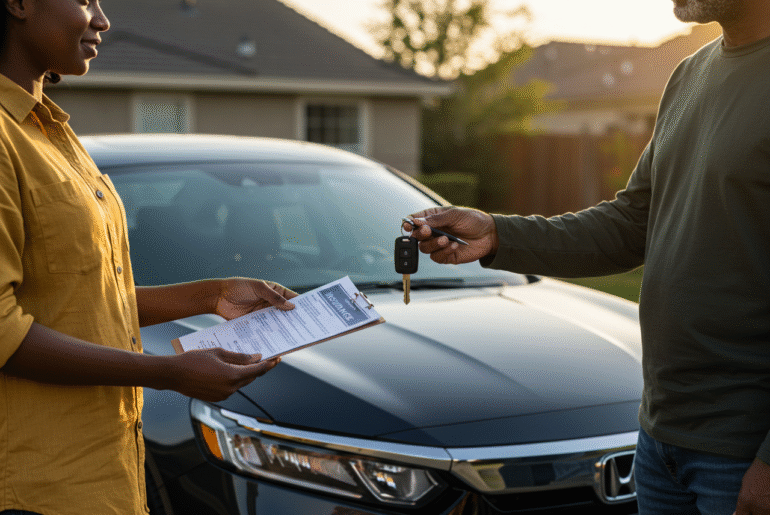This article may contain references to products or services from one or more of our advertisers or partners. We may receive compensation when you click on links to those products or services. Nonetheless, our opinions are our own.
The information presented in this article is accurate to the best of our knowledge at the time of publication. However, information is subject to change, and no guarantees are made about the continued accuracy or completeness of this content after its publication date.
- How to Get Coverage Without Being on the Title
- Introduction
- Car Insurance and Ownership in the United States
- What It Means to Insure a Car
- Who Is the Owner for Insurance Purposes
- When You Need Insurance for a Car You Don’t Own
- Borrowing a Car From Family or Friends
- Driving a Company or Leased Car
- What Insurers and State Laws Require
- What Insurable Interest Means for Insurance
- State Laws That Affect Non-Owner Insurance
- How to Insure a Car Not in Your Name
- Documents and Permissions You’ll Need
- Common Problems and Solutions
- How to Complete the Process
- Final Thoughts
- Frequently Asked Questions
- Can I get car insurance if I am not the registered owner?
- What is non-owner car insurance and who needs it?
- Will my insurance cover me if I regularly drive someone else’s car?
- Can I add a car to my policy if I don’t live at the same address as the owner?
- Recommended Reads
How to Get Coverage Without Being on the Title
- Learn about how to get a car insurance policy for a vehicle if your name is not on the title.
- Look into non-owner car insurance to see how it works, what it is for, and when it is the best choice.
- Find out how insurable interest can affect what is needed to get coverage and if you qualify.
- See what insurance companies need from you if you want to get insurance for a car that belongs to another person.
- Know about legal and real-life situations, like if you borrow a car from your family or use a leased car.
- Follow clear steps to get insurance as a non-owner driver.
Introduction
Have you ever thought about if you can get insurance for a car that you do not own? The rules for car insurance can be confusing, and having coverage for damage or injury to others is very important when you are out driving. You might borrow a car from your family, or maybe you drive a car that you lease. No matter what, you have to be sure that you have the right insurance. This article will help you see when you can get car insurance for a car that is not in your name and when you can’t. You will read about their normal cases, like insurance for people who do not own a car, and other ways for people who do not own the car to get insurance.
Car Insurance and Ownership in the United States
Car insurance is something that most states in the U.S. need you to have by law. Insurance plans often look at who owns the car. Most companies want the person who owns the car to be the same one on the policy. If the car title is not in your name, this can make it hard when you try to get a car insurance plan.
Knowing how insurance companies see car ownership and coverage for accidents helps you handle these rules. The link between who owns the car on paper and who has the insurance policy decides if you can get coverage. It also affects state laws about insuring cars that someone does not own.
What It Means to Insure a Car
Insuring a car means that you buy a car insurance policy. This will help you with money if your car is in an accident, gets stolen, or has damage. It is an agreement you make with your insurance company. They promise to help you with costs if something bad and unexpected happens. Most car insurance has different choices. It can help if your car hits another car. There is also help if something else damages your car. Some plans cover you if the other driver has no insurance.
To get insurance, you often need to have insurance coverage that is linked to owning the car. Most car insurance companies will want you to own the car or show a reason why you need to insure it. This is done to protect the money the owner or drivers have in the car.
Your car insurance policy helps keep your money safe. It also protects other drivers and property owners if something goes wrong and there’s an accident. The payout terms tell you how the company pays for medical bills, legal costs, and damages. This protects you from a lot of stress when bad things happen.
Who Is the Owner for Insurance Purposes
In the insurance world, the vehicle owner is usually the one whose name is on the car’s title or registration. This is often the person who paid for the car in full or the one who is paying for it with a loan from a lender. The registered owner is the person who must keep the vehicle insured and in good condition.
The departments of motor vehicles in each state want the car insurance details to match with the car owner’s name. This is why it is important for you to be listed as the registered owner. But things can get tricky when more than one person uses the car, if you get a car as a gift, or if the car is leased.
If the car title has more than one name, like when two people own the car together, it is important to know what words like “and/or” mean on the title. These words tell you who needs to give permission to make changes to the ownership. They also show if the people can both be on the same insurance policy. Knowing this helps everyone be clear and keeps things simple, so there is no mix-up or problems later.
When You Need Insurance for a Car You Don’t Own
Life can sometimes ask us to be flexible with auto insurance. Non-owner car insurance is helpful when you do not own a car but still often use someone else’s car or rent cars. In the same way, some insurance companies give special policies for people who often drive a family member’s car for a long time.
These insurance plans usually cover damage that you may cause to others. But getting the proper insurance also depends on things like legal rules and state laws. If you borrow your friend’s car or drive a rented car, you might need special choices made just for non-owners.
Borrowing a Car From Family or Friends
If you use a family member’s or friend’s car once in a while, you are often allowed to do so with their permission. Most car insurance will cover anyone who has permission to drive the car, not just the owner. But things are different when you drive someone’s car all the time. If you use a friend’s car often, you may need to get extra coverage.
Named drivers can be added to the owner’s policy, which means your regular use will not stop the coverage. You can also ask the owner to put you on as an extra driver. This helps keep both of you safe if there is an accident.
Having the right papers and permissions, like proof of insurance and your car registration, can help make things go more smoothly. When you talk to the insurance company, it helps everyone know what is happening. This can stop people from saying no to claims or canceling a policy if there is a mix-up about the setup.
Driving a Company or Leased Car
Driving a company car or a leased car comes with some special insurance needs. Most of the time, the company or the group that leased the car has the main insurance for it. But, if you use this car for your own reasons or outside of work, you might need extra coverage in case of an accident.
Sometimes, you need to have the leasing agency share the title with you to sort out who has a right to insurance. A policy like this helps make sure your coverage matches what you need when you drive. It also helps you follow the law. Many employers give out company car insurance, too. This means their workers have coverage when they drive work vehicles.
If you’re leasing, make sure to check if the lease lets you get extra coverage. Each lease is different. It’s important that you get the type of policy that protects both you and the car.
Voted "Best Overall Budgeting App" by Forbes and WSJ
Monarch Money helps you budget, track spending, set goals, and plan your financial future—all in one app.
Get 50% OFF your first year with code MONARCHVIP
What Insurers and State Laws Require
When you try to get car insurance for a car that is not in your name, you need to know the law and what the insurance company asks for. Most companies will ask you to show proof that you have a reason and a close money connection to the car. This helps both you and the company. It makes sure there is not more risk for anyone involved.
State laws also shape the process, especially in states where registrations and policies need to have the owner’s name. Checking these legal rules helps you know what you need for enough liability coverage fast.
What Insurable Interest Means for Insurance
Insurable interest is the key part of any insurance policy. It means that a person has a monetary interest in the car. This can be because they own the car, rent it, or help with looking after it. If there is no proof that a person has an insurable interest, it gets hard to get insurance.
Insurance companies point out the risk of losing money when they look at insurable interest. If you do not own the car but you use it a lot, you may have to show enough proof about how any harm or damage could hurt your money in a direct way. This makes sure the policy meets the law and keeps everyone safe.
For example, to get insurance for a car you borrow from a friend, you usually need to show that you rely on that car for getting around. Insurable interest does not just change how claims are paid out; it also decides if you can have special policies like non-owner car insurance.
State Laws That Affect Non-Owner Insurance
State laws play a big part in what you can do to get insurance for cars you do not own. Every state says you must have a certain amount of car insurance at the least. Some states, like New York, say the name on the car’s registration and the name on the insurance must be the same. Other states may give you other choices.
Here’s a table of the states where you can register a car without having insurance:
| State | Requirement |
|---|---|
| Mississippi | None |
| New Hampshire | None |
| North Dakota | None |
| Tennessee | Must provide financial responsibility proof, like a $65,000 bond |
| Washington | Self-insurance or $60,000 liability bond required |
| Wisconsin | Proof of insurance required only for specific circumstances |
Knowing these state rules helps you follow the law when you look into non-owner insurance policies.
How to Insure a Car Not in Your Name
Getting insurance for a car that you do not own needs careful thought. First, you should find out your choices. You can look at non-owner car insurance, be part of the car owner’s policy, or set up co-ownership. Each of these steps means you need the right legal rules and papers to show you have permission.
Auto insurance depends on if you use the car all the time or just sometimes. When you follow the right steps, you get steady coverage. This keeps you safe and makes sure you have the coverage you need. It also helps you follow the rules in your state.
Documents and Permissions You’ll Need
Getting the right documents and permissions is important when you want to get insurance for a car that is not in your name. First, you should show that you have something to lose or gain with the car. This is called an “insurable interest.” A letter from the car’s owner that gives you permission can be used to prove this. The main papers you need are the car’s title, the registration, and the details about the person who drives the car most. You should also have any papers about a current auto insurance plan. This will make it quicker when talking with insurance companies.
Common Problems and Solutions
Insuring a car that is not in your name can bring a lot of common problems. One of the main issues is showing to the company that you have a reason to be covered, which is often tough for friends or family. A lot of insurance companies have set rules for people trying to get coverage if they are not the car owner. The best way to get past these issues is to talk with the owner in a clear way. Gather the right papers, like the car title and permissions you need from them. You should also know state rules and look into the several coverage choices out there. These steps can help make the process easier and help you get insurance for a car not in your name.
How to Complete the Process
Step 1: Check State Rules and Company Policies
You need to know the rules in your state before you try to get insurance for a car that is not in your name. Every state has its own laws, and these laws can change if you can get this type of insurance. Also, every insurance company has its own rules about who can be covered for a car they do not own and what coverage you may get for cars like this. It is a good idea to talk with several insurance companies to see what they will and will not cover for you. Doing this will help you follow both the law and what the insurance company asks for. Knowing all this can make everything easier for you when working with them.
Step 2: Gather Needed Documents and Permissions
Getting the right papers is important if you want to insure a car that is not in your name. Start by getting the car’s title, the vehicle registration, and proof that the car is owned by the person who is registered. You will also need to have their clear permission to insure the car. A signed paper can show this. If you are insuring a family member’s car, it is good to talk with them about the plan. This can help show that you have a reason to insure the car. It also makes sure that all people know what their part is with the insurance policy.
It is important to look at all the choices when you need to insure a car that is not in your name. Non-owner car insurance gives you coverage in case you cause damage while driving a car you do not own or have your own insurance for. Another way is to add the car to an insurance plan that already exists. This way, you get steady coverage as part of the owner’s own plan. You could also have both your name and the owner’s name on the car title. This shows you have a reason to insure the car and helps make sure you can deal with any loss after an accident. Look at these ways to see which one is best for you.
Step 4: Apply and Confirm Your Coverage
After you get all the documents you need, filling out the application should be easy. Make sure you clearly say that you have an interest in the vehicle. The insurance company will ask for this so they can give you coverage. Once you send in your application, quickly check with your provider about your coverage. This makes sure your policy is active and also helps you know the type of policy you chose and how much you will pay for car insurance. Don’t forget to ask about other kinds of coverage, like protection if your car is damaged or in an accident, and property damage if you need it.
Final Thoughts
You can get car insurance for a vehicle that is not registered in your name if you take the right steps. You have to know the rules for your state and what each insurance company wants. There are choices like non-owner car insurance plans. These can give you enough coverage. That way, you stay safe from money problems if there is an accident. Always talk clearly with your insurance company. You should have the right papers ready if they ask. These tips will help you get insurance for a friend’s car or a family member’s car with little trouble.
Frequently Asked Questions
Can I get car insurance if I am not the registered owner?
Yes, you can get car insurance even if you are not the one who owns the car. Many insurance companies have policies for people who do not own a car or let you add coverage to an insurance plan that is already there. Make sure you have the needed permission and papers with you so the process can go smoothly.
What is non-owner car insurance and who needs it?
Non-owner car insurance gives you coverage if you drive a car that is not in your name. This type of policy is good for people who rent cars a lot, borrow someone else’s car, or use ride-sharing often. It will help if there is an accident while you drive a car you do not own. You do not need to get full coverage for this type of plan. This way, you are covered every time you drive another person’s car.
Will my insurance cover me if I regularly drive someone else’s car?
Your insurance usually covers you if you drive someone else’s car, as long as you have their okay. But the way you are covered can change depending on your own plan and the car owner’s insurance. It is a good idea to talk to your insurance company to make sure you have the right protection in these cases.
Can I add a car to my policy if I don’t live at the same address as the owner?
Yes, you can often add a car to your policy even if you do not live at the same address as the owner. The insurance company might ask for some documents and approval from the person who owns the car to finish this process.

Reviewed and edited by Albert Fang.
See a typo or want to suggest an edit/revision to the content? Use the contact us form to provide feedback.
At FangWallet, we value editorial integrity and open collaboration in curating quality content for readers to enjoy. Much appreciated for the assist.
Did you like our article and find it insightful? We encourage sharing the article link with family and friends to benefit as well - better yet, sharing on social media. Thank you for the support! 🍉
Article Title: Can You Insure a Car Not in Your Name?
https://fangwallet.com/2025/07/04/can-you-insure-a-car-not-in-your-name/The FangWallet Promise
FangWallet is an editorially independent resource - founded on breaking down challenging financial concepts for anyone to understand since 2014. While we adhere to editorial integrity, note that this post may contain references to products from our partners.
The FangWallet promise is always to have your best interest in mind and be transparent and honest about the financial picture.
Become an Insider

Subscribe to get a free daily budget planner printable to help get your money on track!
Make passive money the right way. No spam.
Editorial Disclaimer: The editorial content on this page is not provided by any of the companies mentioned. The opinions expressed here are the author's alone.
The content of this website is for informational purposes only and does not represent investment advice, or an offer or solicitation to buy or sell any security, investment, or product. Investors are encouraged to do their own due diligence, and, if necessary, consult professional advising before making any investment decisions. Investing involves a high degree of risk, and financial losses may occur including the potential loss of principal.
Source Citation References:
+ Inspo
There are no additional citations or references to note for this article at this time.












































